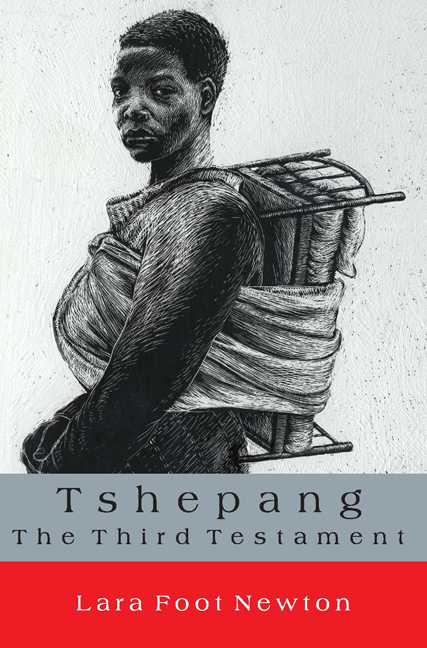Tshepang: The Third Testament
Published online by Cambridge University Press: 04 October 2019
Summary
SIMON tells the entire story and acts out all the characters.
RUTH is silent.
The loaf of bread represents the baby, and the broom represents Alfred Sorrows.
In the dark we hear the sound of salt being rubbed into an animal hide.
Lights.
A woman, with a small bed tied to her back with a blanket sits on a heap of rock-like salt, which covers a pile of animal skins. She rubs the salt into the skins. A man sits next to her, pensive. He looks down onto a village. He looks at her, she stops rubbing.
SIMON: Ja … you know, here … the heat is different. Not like there in other places. Here the heat knows it's hot. And it enjoys being hot. The sun is always looking at us. Watching us. The big baas, the Makulu baas. So we take our beds from our houses and put them under the trees, no one can sleep here. Not when Makulu has been on duty all day. So we sleep outside under the trees. (That's after we've had a nip or two.) We like to drink here. Because we're thirsty, dors … with Makulu and his hot stinky breath.
And besides, nothing ever happens here. Nothing. Niks.
RUTH goes back to her rubbing.
SIMON stands, lights a cigarette and looks out into the distance.
Hey! Sarah! Hey!
You see that woman over there?
Silence.
She's got a loose panty.
Her name is Sarah. I happen to know her. She is the one who did nothing when it happened. Just lit a match and walked out of the room.
Her mother owns a shebeen. She has a scar here on her neck, where her boyfriend stabbed her. Kwa! Kwa! Kwa!
He gestures stabbing. RUTH stops rubbing. She is still.
Hey! Sarah!
[To the audience, secretive] I don't have a houvrou you know, they're too much trouble. The others, they all have one, but not me. They're too expensive. A houvrou is a woman that you keep, but she's not your wife. But here it is better to have a houvrou, because you can't get rid of a wife. A houvrou you can let go.
- Type
- Chapter
- Information
- TshepangThe Third Testament, pp. 18 - 45Publisher: Wits University PressPrint publication year: 2005



